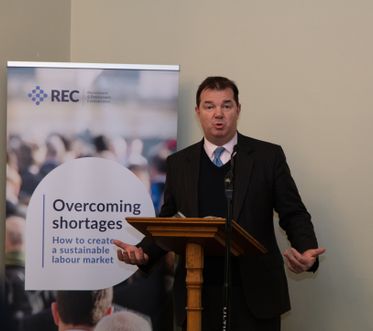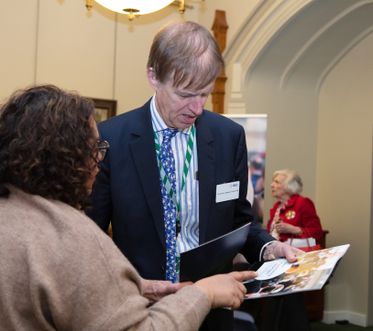Parliamentarians agree with REC’s call for strategic approach to ease squeeze in job market
Government and campaigns
The severity of labour and skill shortages needs no further explanation among Recruitment and Employment Confederation’s (REC) members. That is why it was great to hear parliamentarians praising the value and detail of REC’s Overcoming Shortages report and expressing their commitment to ease the squeeze in the labour market, at an REC parliamentary reception in Westminster, held this week (24 January).
REC Chief Executive Neil Carberry used his closing speech to talk about his relief at signs that a ‘strategic approach’ to overcoming labour shortages was on the agenda of both main parties, as well as in both houses of parliament.
The event was an opportunity for the REC to promote its Overcoming Shortages report to policy makers and industry colleagues. The report makes recommendations for both businesses and governments on issues ranging from skills, reform of the apprenticeship levy, and immigration among others. The aim is to encourage businesses and governments to put the ‘people stuff’ first.
Chair of REC Sarah Thewlis welcomes attendees and said what an important time it is for the economy, highlighting REC research which suggests that with a 10% spike in demand in the economy, and the labour market restricted by shortages, the UK economy would shrink by between 1.2% and 1.6% by 2027. This could cost the economy anywhere between £30 billion and £39 billion every year.
Guy Opperman, Employment Minister, thanked the REC for the report, calling it ‘timely, important and greatly appreciated’. Opperman said talks are happening at Cabinet-level about dealing with labour shortages, especially the need to reduce the number of economically inactive people in the UK. He is particularly interested in the REC report and REC’s wider suggestions on improving access to work such through childcare to allow those with caring responsibilities to work without fear over the quality or cost of provision. As part of REC’s upcoming budget submission, REC asks for a full review into the current childcare system to ensure a long-term sustainable system is in place, to help working parents and grandparents stay in work, and others to get into work.
The minister is keen to hear new ideas from the recruitment industry on getting older workers back into the workforce. The minister spoke of his passion for the government’s ‘Mid-life MOT’: a review for workers in their 40s and 50s that helps them take stock of their finances, skills and health, and enables them to better prepare for their retirement and build financial resilience.
At the event, Labour’s Shadow Minister for Employment Rights Justin Madders also praised the insights offered by the report. Madders said hundreds of thousands of people want to get back into work and Labour’s New Deal for Working People, which Labour claims will be signed into law within the first 100 days of a Labour government, will help. As well as Fair Pay Agreements, it will include creation of a single status of ‘worker’ for all but the genuinely self-employed – something the REC is keen to understand more about and influence their thinking on. He also mentioned their policies on the right to flexible working for all workers as a default from day one, establishing a single enforcement body to enforce workers’ rights - a long-term REC ask. And extending statutory parental leave and increasing Statutory Sick Pay (SSP) and making it available to all workers. There is much for the REC to engage with Labour on to influence and shape their ideas to ensure they work for our industry and temporary workers.
Attendees at the reception included parliamentarians with an interest in employment, civil servants, journalists, wider industry representatives and REC members from different sectors.
Lord Bridges of Headley, Chair of House of Lords Economic Affairs Committee, commented that the £30-£39 billion at risk from labour shortages ‘should focus the mind’ on this issue. The peer cited his committee’s report from December 2022 titled ‘Where have all the workers gone?’ He was keen to tell the audience at the reception, that although the population is getting sicker, most of the rise in sickness-related inactivity is among people who are already inactive. His committee believes earlier retirement is the biggest reason and it expressed concern that the rise in economic inactivity makes it harder to control inflation, damages growth, and puts pressure on already stretched public finances. He said, although the departure of EU workers has been counterbalanced by the arrival of non-EU workers, he said this contributed to a skills mismatch within the labour force, accentuating vacancies and labour shortages in certain sectors.
Neil Carberry closed the speeches by praising the success of the REC’s Restart partnership, a collaboration between the REC and Maximus. This partnership was formed in response to REC members' recent feedback expressing recruitment challenges. This service is bespoke to companies and sectors, as well as to the individual, and is included as part of someone’s REC membership. He also said that the Overcoming Shortages report has recommendations for the business as well as the government because positive change is ‘not all about government’.
Below (left-to-right) are Minister for Employment Guy Opperman MP, Chair of Economic Affairs Committee Lord Bridges of Headley MBE and Work and Pensions Committee Chair Stephen Timms MP



Share this article

